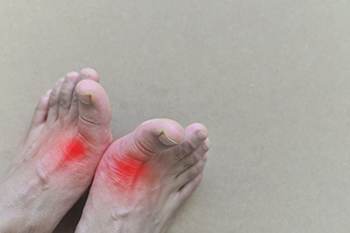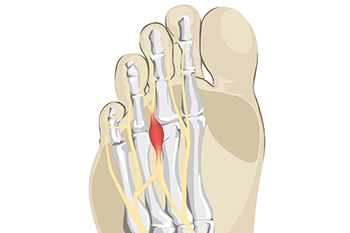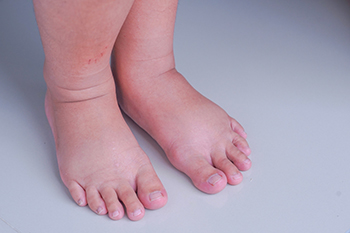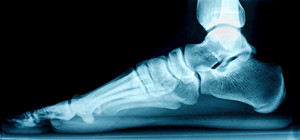Blog
Items filtered by date: July 2023
Specific Foods Can Be Linked to Gout Attacks

Gout is defined as a foot condition that can cause severe pain and discomfort. It often targets the joints in the big toe and is caused by an excess level of uric acid. Eating foods that have high levels of purines may cause uric acid levels to rise and convert to crystals that lodge in the joints of the toes. There are trigger foods that can be avoided in patients who have gout, and this may reduce the number of painful gout attacks. Red meat can fall into this category, and frequently eating this food can increase the chances of getting gout. Many people think honey is an alternative to processed sugar, however, it also contains a large amount of uric acid. There are certain types of seafood that have high levels of purines. These can consist of shellfish, sardines, anchovies, and scallops, and gout patients are advised to eat infrequent or small amounts of these types of seafood. If you would like more information about what type of foods can trigger gout attacks, it is suggested that you confer with a podiatrist who can provide you with healthy food choices to choose from.
Gout is a painful condition that can be treated. If you are seeking treatment, contact Dr. Dean D. Hinners from Illinois. Our doctor will treat your foot and ankle needs.
What Is Gout?
Gout is a form of arthritis that is characterized by sudden, severe attacks of pain, redness, and tenderness in the joints. The condition usually affects the joint at the base of the big toe. A gout attack can occur at any random time, such as the middle of the night while you are asleep.
Symptoms
- Intense Joint Pain - Usually around the large joint of your big toe, and it most severe within the first four to twelve hours
- Lingering Discomfort - Joint discomfort may last from a few days to a few weeks
- Inflammation and Redness -Affected joints may become swollen, tender, warm and red
- Limited Range of Motion - May experience a decrease in joint mobility
Risk Factors
- Genetics - If family members have gout, you’re more likely to have it
- Medications - Diuretic medications can raise uric acid levels
- Gender/Age - Gout is more common in men until the age of 60. It is believed that estrogen protects women until that point
- Diet - Eating red meat and shellfish increases your risk
- Alcohol - Having more than two alcoholic drinks per day increases your risk
- Obesity - Obese people are at a higher risk for gout
Prior to visiting your podiatrist to receive treatment for gout, there are a few things you should do beforehand. If you have gout you should write down your symptoms--including when they started and how often you experience them, important medical information you may have, and any questions you may have. Writing down these three things will help your podiatrist in assessing your specific situation so that he or she may provide the best route of treatment for you.
If you have any questions, please feel free to contact one of our offices located in Metropolis and Eldorado, IL . We offer the newest diagnostic and treatment technologies for all your foot care needs.
Morton’s Neuroma and High Heels

Some people feel the sensation of having a small pebble in their sock or shoe, and this can be a symptom of the foot condition known as Morton’s neuroma. It can develop as a result of wearing shoes that do have enough room in the toe area to move freely in. High heels can fall into this category and can affect women who frequently wear this type of shoe. This ailment affects the nerve between the third and fourth toes and can cause severe pain and discomfort. The nerve can become compressed and irritated, and mild relief may be felt when the shoes that are worn have a wider toe box. This condition will not improve when high heels are consistently worn, and surgery may be necessary to remove or repair the nerve. Patients may find some relief when anti-inflammatory medications are taken and the affected foot is massaged. If you have pain in this part of your foot, it is suggested that you visit a podiatrist who can diagnose and treat Moton’s neuroma.
Morton’s neuroma is a very uncomfortable condition to live with. If you think you have Morton’s neuroma, contact Dr. Dean D. Hinners of Illinois. Our doctor will attend to all of your foot care needs and answer any of your related questions.
Morton’s Neuroma
Morton's neuroma is a painful foot condition that commonly affects the areas between the second and third or third and fourth toe, although other areas of the foot are also susceptible. Morton’s neuroma is caused by an inflamed nerve in the foot that is being squeezed and aggravated by surrounding bones.
What Increases the Chances of Having Morton’s Neuroma?
- Ill-fitting high heels or shoes that add pressure to the toe or foot
- Jogging, running or any sport that involves constant impact to the foot
- Flat feet, bunions, and any other foot deformities
Morton’s neuroma is a very treatable condition. Orthotics and shoe inserts can often be used to alleviate the pain on the forefront of the feet. In more severe cases, corticosteroids can also be prescribed. In order to figure out the best treatment for your neuroma, it’s recommended to seek the care of a podiatrist who can diagnose your condition and provide different treatment options.
If you have any questions, please feel free to contact one of our offices located in Metropolis and Eldorado, IL . We offer the newest diagnostic and treatment technologies for all your foot care needs.
Are You Suffering From Ingrown Toenails?
Why Are My Feet Swollen?

The feet are the foundation of the body and are capable of providing adequate balance and support. There are several bones, muscles and tendons that each foot has, and all work together to provide mobility. Patients who stand for long periods may develop edema, which is the medical term for swollen feet. Gravity can cause the blood to pool in the lower legs and feet, and shoes can become tighter. Swollen feet may also be prevalent among pregnant women and people who eat foods with excessive amounts of salt. Swollen feet may be reduced when frequent walking is done and salty foods are reduced. It is helpful to drink plenty of water daily, in addition to wearing compression socks or stockings. Being obese may lead to developing swollen feet, and it is beneficial to eat healthy foods. This may help to reduce or eliminate swollen feet. If your feet have become swollen, it is suggested that you visit a podiatrist who can correctly diagnose and offer treatment options for this problem.
Swollen feet can be a sign of an underlying condition. If you have any concerns, contact Dr. Dean D. Hinners of Illinois. Our doctor can provide the care you need to keep you pain-free and on your feet.
Swollen feet are a common ailment among pregnant women and people who stand or sit for extended periods. Aging may increase the possibility of swollen feet and patients who are obese often notice when their feet are swelling too. There may be medical reasons why swollen feet occur:
- Phlebitis - A condition that causes the veins to become inflamed and can also cause leg pain.
- Liver disease - This may lead to low blood levels of albumin which is a protein. This can cause fluid in the blood to pass into the tissues and several areas of the body can become swollen.
- Heart failure - When the heart doesn’t pump properly the blood that is normally pumped back to the heart can pool in the veins of the legs causing swollen feet.
- Kidney disease - One of the main functions of the kidneys is releasing excess fluid in the body. This type of condition can make it difficult for the kidneys to function properly, and as a result the feet may become swollen.
- Deep-vein thrombosis (DVT)- This is a serious condition where blood clots form in the veins of the legs. They can block the return of blood from the legs to the heart which may cause the feet to swell. It is important to be treated by a podiatrist if this condition is present.
Swollen feet can also be caused by bone and tendon conditions, including fractures, arthritis, and tendinitis. Additionally, there may be skin and toenail conditions and an infection may cause the feet to swell. Patients who take medicine to treat high blood pressure may be prone to getting swollen feet.
Many patients elevate their feet to help relieve the swelling and this is generally a temporary remedy. When a podiatrist is consulted the reason behind the swelling can be uncovered and subsequently treated.
If you have any questions please feel free to contact one of our offices located in Metropolis and Eldorado, IL . We offer the newest diagnostic tools and technology to treat your foot and ankle needs.
Exercises for Flat Feet

Children are naturally born with flat feet, and by the time they are teenagers, the arch usually develops normally. However, there are various circumstances where the arches either do not develop or they fall. These include injuries, obesity, genetics, and arthritis. Those with neurological or muscular diseases may also be more prone to having flat feet. Wearing orthotics or arch supports, and performing certain stretches, can reduce pain from fallen arches or help correct them. Examples of exercises that might help raise, strengthen, and lengthen the arches are heel stretches and tennis or golf ball rolls. Stretch your heels by standing with your hands resting on a wall at eye level. Keep one leg forward and the other extended behind you. Press both heels into the floor. Then bend one leg at a time toward the wall with the opposite heel pressed into the floor and hold this position for 30 seconds. Repeat on each side four times. For the tennis or golf ball roll, sit in a chair with a ball under one foot. Keep a straight spine and roll the ball under your foot, focusing on the arch. Do this for two to three minutes and then change feet. If you have flat feet and they are causing you discomfort, it is suggested that you consult with a podiatrist who can provide you with additional exercise options and further treatment that is right for you.
Flatfoot is a condition many people suffer from. If you have flat feet, contact Dr. Dean D. Hinners from Illinois. Our doctor will treat your foot and ankle needs.
What Are Flat Feet?
Flatfoot is a condition in which the arch of the foot is depressed and the sole of the foot is almost completely in contact with the ground. About 20-30% of the population generally has flat feet because their arches never formed during growth.
Conditions & Problems:
Having flat feet makes it difficult to run or walk because of the stress placed on the ankles.
Alignment – The general alignment of your legs can be disrupted, because the ankles move inward which can cause major discomfort.
Knees – If you have complications with your knees, flat feet can be a contributor to arthritis in that area.
Symptoms
- Pain around the heel or arch area
- Trouble standing on the tip toe
- Swelling around the inside of the ankle
- Flat look to one or both feet
- Having your shoes feel uneven when worn
Treatment
If you are experiencing pain and stress on the foot you may weaken the posterior tibial tendon, which runs around the inside of the ankle.
If you have any questions please feel free to contact one of our offices located in Metropolis and Eldorado, IL . We offer the newest diagnostic and treatment technologies for all your foot and ankle needs.

